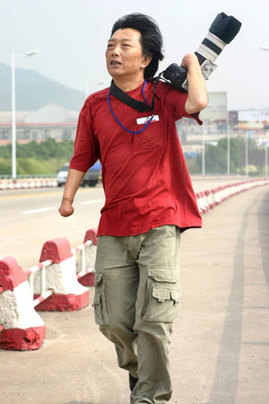Though he has no hands, that hasn't stopped Zheng Longhua from mastering the art of photography. Zheng, 49, manages his camera using his wrists. The native of Lin'an, Zhejiang province, lost his hands in an accident as an infant. He has been a photographer for about three decades.
|

Zheng Longhua, whose exhibition is perfectly timed during the Paralympic Games. [China Daily]
|
Zheng has prepared a photo essay on the outstanding achievements of 100 disabled people. It is on exhibition at the National Library of China until Sept 8.
The essay highlights the successes of people who have overcome physical difficulties, including the loss of their legs or hands. It took Zheng three years to complete the project.
"I chose to portray the 'sunny side' of the disabled instead of articulating their physical deformity, though the latter is more sensational," Zheng says. "I want my work to be more encouraging."
He is familiar with each subject's personal story.
Tan Chuanhua is known as Tan Mujiang ("the carpenter") for the beautiful wooden combs he produces; his disability is less well known. He lost his right hand when he was 18.
He has suffered hardship and discrimination, in Zheng's words, as "a man without a hand who could not take care of himself, let alone others". He began producing wooden combs at age 31. Two decades later, his business produces 42 million wooden combs annually, with about 500 chain stores and 1,700 employees, of whom about 300 are disabled.
"Those who believe in miracles can create miracles. I was moved and inspired by them," Zheng says of his subjects.
Yang Hezheng is another individual featured in the photo essay. The 36-year-old was left unable to walk after a childhood ailment, but he has been funding a community reforestation project since 1998.
"Although people laughed at me, saying 'you can't even walk steadily on level ground, let alone climb hills to plant trees', I continue to care for nature. I believe in myself," Yang says.
He raised the money for the project by running an art workshop in Xi'an, Shaanxi province.
"When Zheng came to photograph me, I was shocked. Any photographer has difficulty in catching a fleeting image, let alone a man without hands. I understand the hardship as I'm suffering the same."
Zheng won instant trust from almost all those he interviewed.
"The disabled just understand each other," Zheng says. But that does not mean the path was always smooth. "It's like a pilgrimage full of adversities, but I'm used to the rule that I have to suffer to get anywhere."